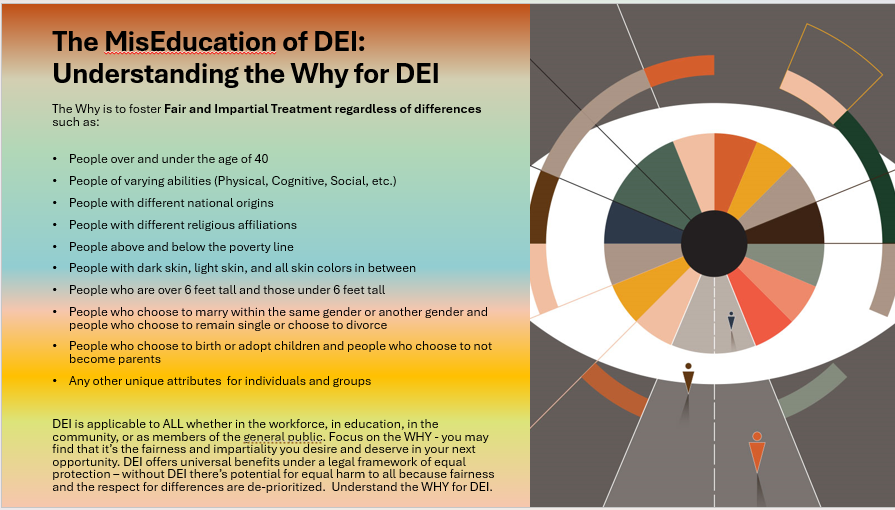The “DEI Hire”: Distracting & Obstructionist Language that Creates Equal Harm to Your People Agenda
- srjosephlawfirm
- Aug 25, 2024
- 3 min read
The notion of a "DEI hire" wrongly frames DEI as a race-driven effort. It fuels a false perception that DEI creates advantages for some to the disadvantage of others or that DEI advances people, particularly people of color and generally black people, irrespective of qualifications. The race-based theories about DEI are simply illogical because they run counter to the legal (and regulatory) framework under which sound DEI efforts are based. The so-called “DEI hire” epitomizes how inappropriate, to say it mildly, this descriptive language is when describing people. So, giving a benefit of the doubt pass to those who use this language, I did a quick Google search using two words: “dei misunderstanding”.
The AI response to the query was as follows:
“A common argument against DEI is that it discourages meritocracy. One of the most prominent and popular DEI myths is that DEI results in the hiring of unqualified, non-white candidates. DEI is by no means perfect and has its flaws but the goal of DEI was never to hire unqualified candidates into organizations.” The date attached with this model response was February 18, 2024.
With that same Google search, I found another viewpoint that describes the egregiousness of the implications associated with using the phrase “DEI hire”. This point of view was shared in a well-written blog post titled “‘Didn’t Earn It’ and Other Lies: DEI Myths Debunked”, published July 11,2024 by YW Boston and found on their website. It was the 8th hit in my Google search and what a find it was! While laying out a full and eloquent rebuttal to many myths about DEI, the author notes that some people go so far as “to co-opt DEI as a slur to describe someone”. The notion of a DEI hire is one way DEI is co-opted to create doubt about a person’s abilities and capabilities to perform a job or carry out the duties of a role, more often a high-profile or high-level role. For example, there’s been talk of a DEI Mayor and a DEI Vice President as well as similar references to corporate hires.
In a recent conversation, a white male self-identified as “non-diverse” when talking about being at dinner with a group of black professionals, male and female; the self-identifying “non-diverse” man was over the age of 40, so his assertion about being “non-diverse” seemed like a delusional claim - he was remiss to the fact that fair and equitable laws gave him the same types of protections as those other dinner guests who came within gender, racial and perhaps other protected classes against discrimination. But more importantly, his vocabulary was questionable because diversity is simply a term defined as difference. At that dinner table, he was different and represented the MOST diverse person present as the only white male. Still, he couldn’t see himself as diverse for some reason. Could the reason have been because calling someone “diverse” implies something other than simply being different? I suspect so, and from all indications when “DEI hire” is asserted, there’s a connotation of disparagement and a sentiment that undermines one’s value, particularly when considering contexts and surrounding circumstances when the assertion is made.
On the other hand, a bad hire can span every demographic, male, female, any race or ethnicity, any gender, gender identity or sexual preference, any age, or any other protected characteristic or other unique attribute. However, what makes the hire bad is not usually attributed to one being of a certain demographic. But it seems there’s something more sinister intended than a bad hire when it’s alleged that someone is a so-called DEI hire. Thus, the term “DEI hire” puts the misunderstanding of DEI’s purpose on full display.
When DEI is designed to create universal benefits in the workplace, then everybody is a DEI hire because they are being selected through fair and impartial processes by people who appreciate their unique attributes and by an organization that values and respects differences within its workforce. This is lawful and principled DEI. The myths about DEI are obstructing this view.
Contact us at TULIP if you need a collaborative partner to help you design an operating model that incorporates a DEI framework for delivering universal benefits to your workforce. We have a DEI Analytics & Reporting methodology that relies on a combination of your workforce and business data to roadmap a DEI journey that comports with legal standards, drives alignment across your stakeholders and designs policies and processes for a sustainable people agenda.
To learn more, reach out to us via email at info@tulipadvisory.com or by phone at (678) 990-0910. We look forward to hearing from you! #DEI #Diversity #Equity #Inclusion #EqualProtection #People #WorkforceRisk #BusinessOutcomes #BottomLine




Comments